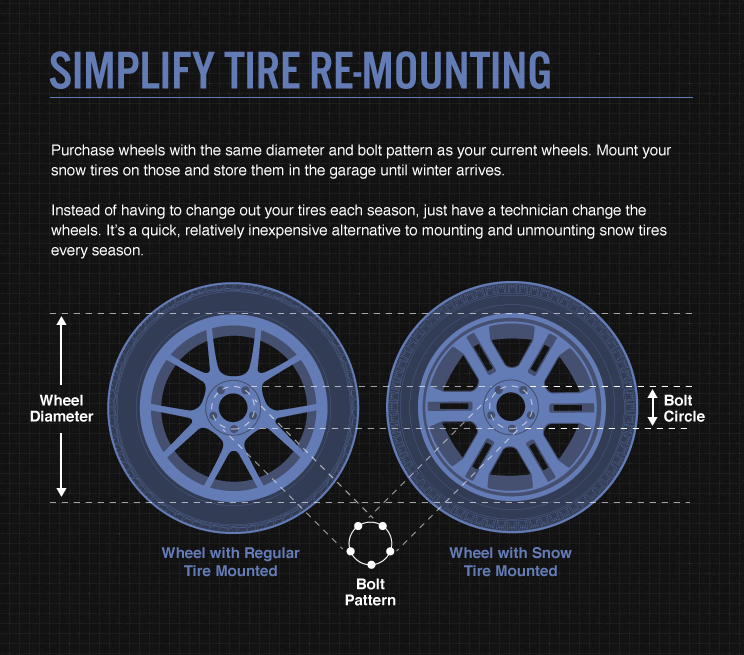Can You Drive Snow and Winter Tires Year Round?
Can you drive snow and winter tires year round? It’s an idea that occurs to many drivers who experience winter weather: If I have to mount snow tires every year, why don’t I just keep them on my vehicle all the time?
Unfortunately, using snow tires year round isn’t recommended. In the long run, it will cost more money than changing them out and could compromise your vehicle’s performance on the road. That’s why tire makers offer different types of tires for different seasons – the best option for you is determined by many factors including climate, driving style, and performance needs.
Here are some specific reasons why year-round use of winter tires is not advised. And if it’s the hassle of tire mounting, unmounting, and remounting that you’re tired of, we’ve included an idea for simplifying that process, too.
First, what is a Winter Tire?
All winter tires, whether studless or studded, are made to maintain better traction in extreme cold, and on icy, snowy, or slushy roads. The rubber is able to remain softer, which makes it more flexible, allowing the tire to conform to the road better in extremely cold conditions. This feature, along with deeper tread depths and specialized tread designs, are what make snow/winter tires ideal for inclement winter weather and extreme cold driving conditions.
We use this analogy - tennis shoes. Yes, you can wear tennis shoes on the beach or in the snow, but wouldn't it be better to have flip flops on the beach and boots for the snow? Winter tires are like snow boots for your car.
Why You Shouldn't Use Winter Tires Year-Round
Winter tires are specially designed for cold temperatures and winter precipitation. Once it gets warm, you won't need deep tread depths to handle snow or biting edges for traction on ice. Here are some specific reasons why using winter tires year round is not recommended.
Faster wear on warm, dry pavement - the tread rubber of winter tires is considerably more flexible than that of all season and summer tires. That same pliable tread rubber that adds traction in winter will wear down quickly in warm temperatures. Summer and all-season tires are built to withstand warm temperatures, providing long wear life.
Decreased performance - In warm weather, winter tires won't provide the same handling capabilities as summer or all-season tires. Imagine if you needed to make a quick maneuver and your tires were soft and squishy. You won't get the crisp response from a winter tire in warm weather. Winter tires need that flexibilitity to handle ice and snow, but it's not as useful in warm weather.
The specialized compounds and tread designs of winter tires are not designed for optimal warm climate performance and wear. Generally speaking, the softer tread of a winter tire will wear out faster in warmer temperatures. If you keep winter tires on your vehicle after winter has come and gone, you will have to replace them sooner than had you removed them for springtime.
That’s why using snow tires year round is more expensive than mounting them seasonally. The sooner they wear out, the sooner you have to replace them.
Simplify Tire Re-Mounting
Driving on snow tires year-round could compromise optimal tread wear and ultimately be more expensive than just changing tires out for the season.

If you were considering year-round use of winter tires because you were tired of having to change them, here’s an idea that could save you time and money. Purchase wheels with the same diameter and bolt pattern as your current wheels. Mount your snow tires on those and store them in the garage until winter arrives.
Instead of having to change out your tires each season, just have a technician change the wheels. It’s a quick, relatively inexpensive alternative to mounting and unmounting snow tires every season.
-
5 Tips to Get the Most From Your Tires
5 Tips to Get the Most From Your Tires
How can you stretch your dollar when it comes to your car’s tires?
Click to Learn More -
When To Replace Your Tires: All You Need To Know
When To Replace Your Tires: All You Need To Know
You’ve probably heard that tires should be changed regularly – perhaps every 3 years, or maybe after every 30,000km of mileage covered. Though this might seem logical, it’s untrue that your tires need to be replaced at a fixed time or mileage interval!
Click to Learn More -
Tire Date Code: What You Need To Know
Tire Date Code: What You Need To Know
Did you know that you can easily tell your tires’ age? Not sure how old your current tires are? No worries, we’ll show you how to easily find out!
Click to Learn More